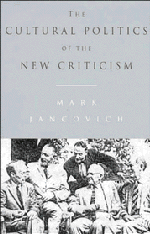Book contents
- Frontmatter
- Contents
- Preface
- List of abbreviations
- Part I The New Criticism and its critics
- Part II The formation of the New Criticism
- Introduction
- 4 John Crowe Ransom: the social relations of aesthetic activity
- 5 Allen Tate: the social organization of literature
- 6 Robert Penn Warren: against propaganda and irresponsibility
- Conclusion: the analysis of a Southern poet
- Part III The establishment of the New Criticism
- Part IV The development of the New Criticism
- Conclusion: Modernism and postmodernism within the American academy
- Conclusion
- Notes
- Bibliography
- Index
5 - Allen Tate: the social organization of literature
Published online by Cambridge University Press: 18 December 2009
- Frontmatter
- Contents
- Preface
- List of abbreviations
- Part I The New Criticism and its critics
- Part II The formation of the New Criticism
- Introduction
- 4 John Crowe Ransom: the social relations of aesthetic activity
- 5 Allen Tate: the social organization of literature
- 6 Robert Penn Warren: against propaganda and irresponsibility
- Conclusion: the analysis of a Southern poet
- Part III The establishment of the New Criticism
- Part IV The development of the New Criticism
- Conclusion: Modernism and postmodernism within the American academy
- Conclusion
- Notes
- Bibliography
- Index
Summary
Tate's contribution to the development of the New Criticism is less easy to characterize than Ransom's, though in many ways it was at least as fundamental. These difficulties arise from the fact that his contribution was not restricted to the impact of his critical writings – it was also a result of his personal influence on Ransom, Warren and others. Tate did not see himself primarily as a critic – at least in the 1920s and 1930s. He was more concerned with his status as a poet. In fact, he maintained an uneasy relationship with the academy until the 1950s. He did spend periods as an academic, but mainly as a way of paying off debts. The uncertainty of this relationship with the academy is important to the development of Tate's ideas and activities. Much of his writing concerned the social and economic situation of the writer in the modern world. He examined the social organization of literary and cultural production. Like Ransom, this interest led him to contrast the traditional society with those forms associated with modernity, forms such as scientific positivism and the cashnexus.
Tate's career was also similar to that of Ransom in another way. Its development can be divided into three stages, but with a strong line of continuity running through them – namely his claim that the modern writer lacked a social basis for aesthetic independence. It is the shifts in the strategies and tactics that he used to establish this basis which distinguishes these stages. In the period up to 1935, Tate was concerned with the decay of the traditional society, and his involvement in Agrarianism was a call for its reconstruction.
- Type
- Chapter
- Information
- The Cultural Politics of the New Criticism , pp. 45 - 54Publisher: Cambridge University PressPrint publication year: 1993



